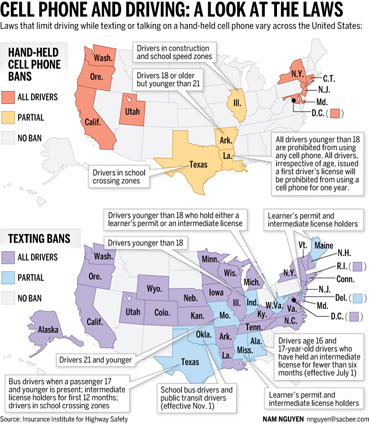
Cell phones are great - unless the person using one is behind the wheel of a car and ends up killing somebody.
Fatal accidents involving cell use while driving have taken their toll in California, and state legislators have reacted by adopting three laws restricting using cells while operating vehicles.
But state Sen. Joe Simitian, author of those laws, says too many motorists are still racing down highways fumbling with cell phones and cruising city streets while pecking at tiny keyboards.
Simitian, who hails from the wireless hub of Palo Alto, has a bill before the state Senate - perhaps today - that would increase first-time base fines from $20 to $50 for breaking existing cell laws and from $50 to $100 for subsequent offenses.
Local county fees tacked onto a fine can double or triple a penalty.
"I think it will make a good law even better," Simitian said. "With every passing year there is a greater appreciation for the risks of distractions while driving."
Simitian's Senate Bill 1475 would also allow a point to be counted against a driver's license for cell phone violations. Points could add up and drivers could lose licenses or see their insurance rates rise.
The bill would also let law enforcement officers stop a teen motorist for any suspected use of wireless devices - not just if they're visibly texting or holding a phone.
Bicyclists, too, would face first-time fines of $20 for gripping hand-held cells while peddling, if Simitian's bill makes it through the Senate, the Assembly and to the governor for his signature.
Since 2007, at least three California drivers have been sentenced to prison on vehicular manslaughter changes for hitting people while driving and using wireless devices.
The California Bicycle Coalition supports Simitian's bill.
Spokesman Jim Brown said drivers carelessly using cells endanger cyclists, and cyclists endanger themselves when they clutch a cell while biking.
"It doesn't take much for those of us not traveling in a big metal box to get hurt," Brown said.
The bill's $20 fine for cyclists would be lower than the new base penalty for drivers, and it wouldn't be subject to additional local penalties.
Simitian's bill would also require that questions about cell rules be added to tests for California driver's licenses. A portion of fines paid by violators would also go toward funding a statewide education campaign, the senator said.
Simitian said enhancing fines for breaking driving and cell laws was the greatest single wish expressed by his constituents in this year's "There Ought to Be a Law" contest.
State legislators, however, haven't always been enthusiastic about tightening rules, Simitian said.
It took him six years to get his first cell phone bill passed in 2006 because many lawmakers thought restrictions seemed intrusive or too broad.
The first bill approved went into effect in July 2008, and imposed a first-time fine of $20 for holding a cell phone while driving.
A second bill in 2007 barred drivers under 18 from using cells while driving, period. A third Simitian bill in 2008 barred all drivers from texting, beginning in 2009.
Simitian said the laws did have a deterrent effect.
A sampling of California Highway Patrol data showed that accidents related to holding cell phones declined 49 percent after the first bill went into effect in July 2008.
During the six months before the bill's enactment, 612 such accidents were reported. During the following six months, 315 were reported.
After the texting law was enacted, surveys by the American Automobile Association showed that drivers were tending to comply with rules.
But new survey results released in April by the Automobile Club of Southern California show that motorists might be up to old tricks.
Before the texting ban, a club survey showed that 1.4 percent of motorists were texting while driving. The figure fell to less than half of 1 percent after the ban, but is now back to almost where it was before the law was passed.
Supporters of Simitian's bill, including the California State Automobile Association, think drivers need to fear stronger consequences.
Last year, the CHP issued only 1,772 citations for texting. Drivers can hide the fact they're reading or writing by putting devices in their laps.
Far more citations - more than 230,000 since July 2008 - have been issued for the more visible violation of holding a cell phone.
Opponents of Simitian's bill include the California Conference Board of the Amalgamated Transit Union, which represents bus drivers.
"We're not against raising fines," said spokesman Barry Broad. The union is against allowing points to soil drivers' personal records, which could threaten bus drivers' livelihoods, Broad said.
However, he said, he believes the bill has a good chance of passing. "You win some, you lose some," he said.











